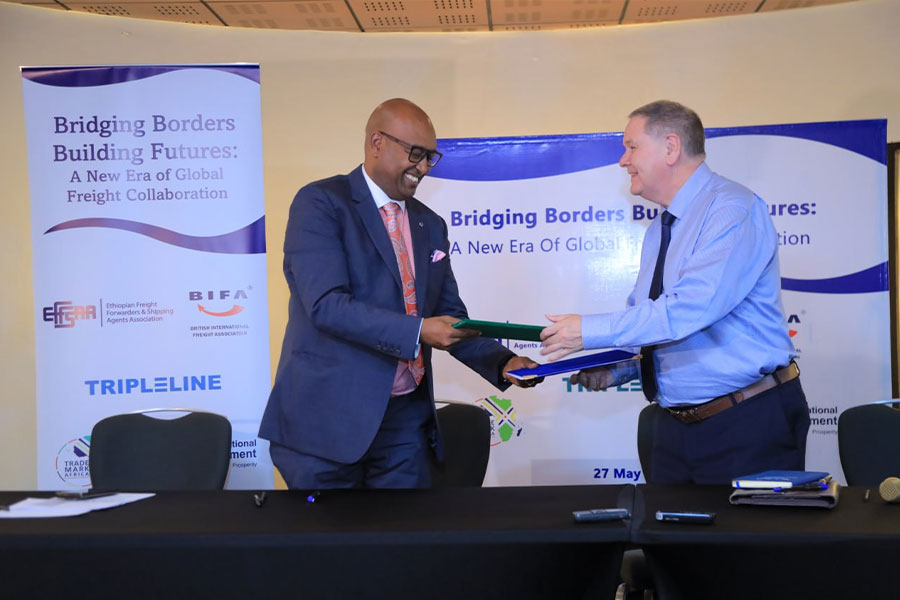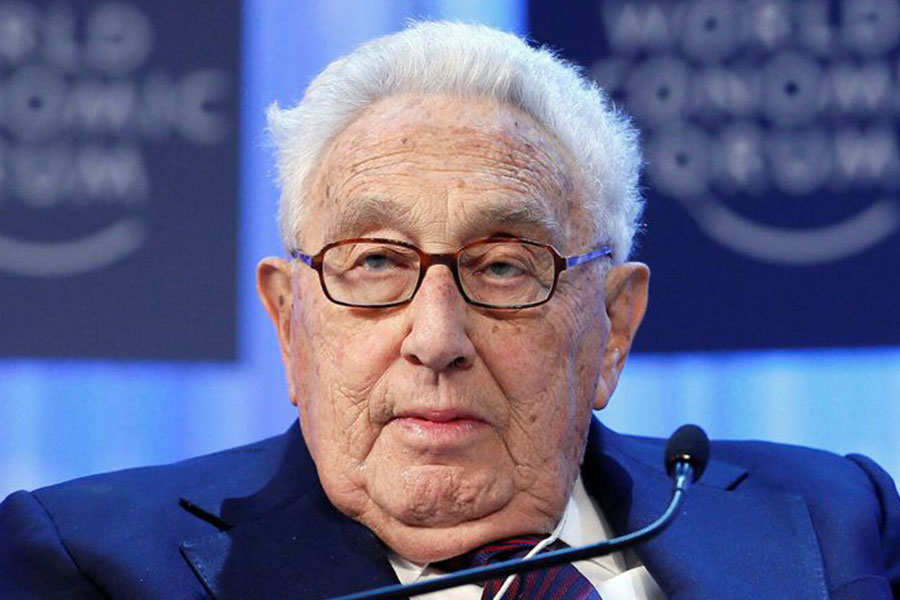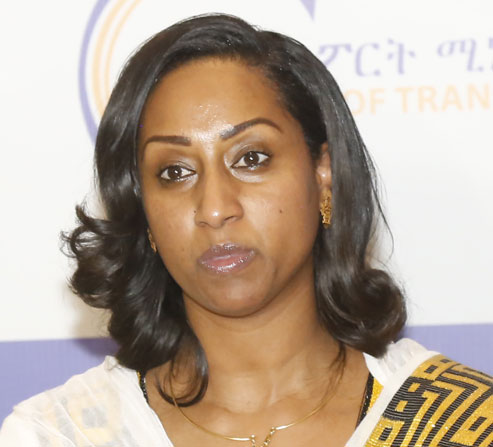
WASHINGTON, DC - The prospect of the world economy appears to be grim this year. The talk among leaders of global finance and development is overwhelmed by words such as “uncertain”, “precarious” and “delicate”. The outlook for Ethiopia, however, seems to be bright, characterized by words such as “reform”, “change” and “hope”.
Rarely does the world appear to be as bullish on Ethiopia as it is now. Judging by talk in the corridors of the World Bank and the International Monetary Fund (IMF) headquarters along 18th and 19th streets in Washington DC, high optimism and expectations are evident. Also, looking at the busy schedule of Ethiopia's Finance Minister, Ahmed Shide, a star speaker at last week's joint biannual meeting of the two institutions, the optimism is well justified. The venue is for governors of central banks and finance ministers of member countries to congregate twice a year.
They come to Washington to get a “measure of reassurance and a measure of warning,” said David Lipton, deputy managing director of the IMF, reflecting on the congregation.
Amidst reassurances and caution, never has Ethiopia invoked such a level of enthusiasm among these international bureaucrats, according to a former senior Ethiopian government official who has been attending these meetings for over 20 years. A year after a change of administration, Ahmed was seen pitching what he called a “comprehensive reform program” designed by the government with goals to create “jobs, jobs and jobs.”
The program may sound as if it is devoid of details, more a “series of reforms” to open the logistics, transport and energy sectors for domestic and foreign private capital. Nonetheless, it did not stop international financiers from hailing Ethiopia as “the most progressive development partner” on the continent.
One such excited personality in global finance is Merisa Drew, CEO of Impact Advisory & Finance for Credit Suisse, a European investment bank that is behind a 1.6-billion-dollar loan to finance the construction of a northbound railway from Addis Abeba to Weldia. Her praise of Ethiopia's current administration was very generous.
“I have to give a big shout out to Ethiopia,” she told an audience gathered to listen to a panel discussion on the power of partnership to mobilise finance in support of Prime Minister Abiy Ahmed's decision in appointing women to fill half of his cabinet posts. “These kinds of decisions make us happy to underwrite projects there. Others who watch what we say will follow suit.”
What Merisa described as “progressive and very appropriate” policy reforms is the mantra of rebalancing the economy from intensively public funded infrastructure development to private sector investment and expansion. The aim is to reduce external debt exposure by curtailing additional loans for new projects funded by the state, while refocusing public investments toward social services, education and health.
It is a prescription out of the rule books of the IMF, whose senior directors said Prime Minister Abiy has “achieved in a year more than what people thought he could have.”
“This Ethiopian government seems to be taking on things with a lot more energy than others for a long time,” a senior IMF director told Fortune.
Although its directors say each country should develop its own growth model, the IMF is more than candid in telling Ethiopia - alongside Benin and Senegal - to hand over the “reins of growth” from the public sector to the private sector.
“In many of these countries, public investment had helped spur high growth, while also steadily increasing public debt levels,” said a statement released addressing finance ministers from across the continent. “Sub-Saharan countries need to strike a delicate policy balance between containing public debt levels, investing in human and physical capital and raising revenues.”
Unlike its outlook for the global economy that is projected to have lower growth than the 3.6pc forecasted earlier, Africa is set to see a rise in growth, its GDP expanding from three percent last year to 3.5pc this year. Although the IMF cautions about wide differences in the rate of growth, 21 African countries are projected to grow by five percent or more, while the outlook for Ethiopia is 7.7pc.
The model that has brought the country to a growth trajectory for a decade and a half is about to change from being state-driven public infrastructure projects to private investment.
“At the heart of our reform is the private sector,” Ahmed told a jubilant audience who appeared to be pleased to hear from him what they believe is a successful path to reform.
The challenge, however, remains how such levels of high growth will be maintained not only in a changing policy climate with its uncertainties but also at a time of political discontent and restlessness created by inter-communal conflicts that are spreading across the country. The administration officials appear to be alarmed more by the mega trend of the youth bulge and related demographic pressures of the current crisis.
In its bid to consolidate its reform agenda, the Ethiopian government is urging its development partners to provide direct budget support, the main reason that Ahmed was in Washington last week. Indeed, there is sufficient goodwill, judging by the reception the idea received by the leaders of multilateral financial institutions. Earlier in Abiy's rise to power, the World Bank made a crucial gesture by directing 1.2 billion dollars in loans for direct budgetary support with a low-interest rate, all of which has been fully disbursed, according to an Ethiopian official knowledgeable of the transfer.
“In its walk in the path of development, we'll continue to support Ethiopia,” a top director of the IMF told Fortune.
There is an ongoing discussion with the World Bank to provide Ethiopia with an additional half a billion dollars in direct budgetary support, a senior Ethiopian government official disclosed to Fortune, although it remains unconfirmed by the Bank.
The World Bank's sister organization, the International Finance Corporation, is finalizing a deal with the government to replicate a flagship project it launched in Zambia to generate off-grid power from an industrial-scale solar energy plant. The idea is for a state-owned corporation to serve as an investment vehicle and publicly tender the projects for private companies to building the infrastructure and distribute renewable energy at a lower cost.
Branded as “Scaling Solar,” the project is run by Ethiopia's Public and Private Partnership Directorate under the Ministry of Finance. The ministry is planning to generate 250MW of power through an industrial-scale solar farm. Close to 28 companies have responded to requests for proposals and a little over half of the firms have been shortlisted with bids expected to be submitted in June.
When completed, the project in Ethiopia will cost over 250 million dollars, according to industry experts. The project will “unleash global private sector engagement with Ethiopia,” according to Ahmed.
Its success will be hailed as a new model of development financing away from loans that are blamed for exposing the least developed economies to unsustainable external debts and a vindication of the rebalancing mantra.
A panel discussion at a conference held for leaders of global finance and development sponsored by the World Bank and the International Monetary Fund in Washington DC last week. Shown in the picture is Ethiopia’s Finance Minister, Ahmed Shide, addressing the panel.
PUBLISHED ON
Apr 13,2019 [ VOL
20 , NO
989]

Radar | Nov 09,2019

Radar | May 31,2025

Verbatim | May 27,2023

Radar | Jul 29,2023

Sunday with Eden | Oct 16,2020

Radar | Jul 02,2022

Radar | May 08,2021

Fortune News | Jan 19,2024

Viewpoints | Apr 02,2022

Editorial | Aug 17,2019

Dec 22 , 2024 . By TIZITA SHEWAFERAW
Charged with transforming colossal state-owned enterprises into modern and competitiv...

Aug 18 , 2024 . By AKSAH ITALO
Although predictable Yonas Zerihun's job in the ride-hailing service is not immune to...

Jul 28 , 2024 . By TIZITA SHEWAFERAW
Unhabitual, perhaps too many, Samuel Gebreyohannes, 38, used to occasionally enjoy a couple of beers at breakfast. However, he recently swit...

Jul 13 , 2024 . By AKSAH ITALO
Investors who rely on tractors, trucks, and field vehicles for commuting, transporting commodities, and f...

Jun 28 , 2025
Meseret Damtie, the assertive auditor general, has never been shy about naming names...

Jun 21 , 2025
A well-worn adage says, “Budget is not destiny, but it is direction.” Examining t...

Jun 14 , 2025
Yet again, the Horn of Africa is bracing for trouble. A region already frayed by wars...

Jun 7 , 2025
Few promises shine brighter in Addis Abeba than the pledge of a roof for every family...